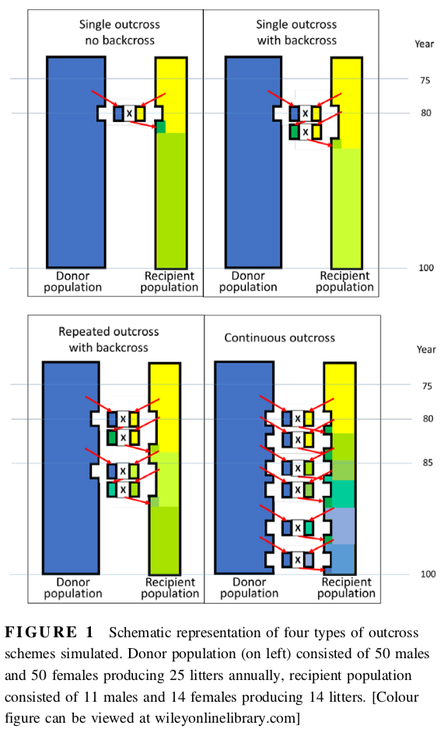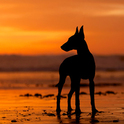For one thing, our dogs are much more inbred than they were a century ago. Many breeds have average levels of inbreeding above 20%, and too many are even higher. With such high levels of inbreeding and low genetic diversity, the dogs in a breed can all be more similar genetically than half- or even full siblings - or even more. How much can you expect to gain from an "outcross" that really amounts to close inbreeding?
| One way we can get an idea of the potential benefits of an outcross is by using simple mathematical models of population genetics (Windig & Doekes 2018). Researchers have simulated various outcrossing strategies for the Saarloos Wolfhond (a cross between a wolf and German Shepherd created in about 1935) and an unrelated "donor" breed. The Saarloos Wolfhond has been a relatively small breed since it was founded, with about 25 litters produced per year and high rates of inbreeding. In the last decade or so, genetic disorders have become a problem and signs of inbreeding depression (smaller litters) have appeared. Because of this, an outcross project was started in 2016. The researchers assessed the consequences of four types of crossbreeding schemes on inbreeding. 1) A single outcross with no backcross; 2) A single outcross with backcross; 3) Repeated outcrosses with backcrossing; 4) Continuous outcrossing. For each of these scenarios, they ran multiple simulations to produce information on the degree of variation that might be produced in a real, randomly breeding population. The F1 from a cross of the recipient (Saarloos) and the unrelated donor breeds will have an inbreeding coefficient of 0%. |
This result is not unexpectded, but it should give pause to those that undertake a crossing program that consists of a single donor cross followed by serial backcrosses. Kennel clubs typically prefer 3 backcrosses before admitting the descendants of a crossbreeding program to the studbook. But the simulations show that the required backcrosses essentially flush the donor genes from the recipient gene pool and there is no net benefit. Indeed, there are multiple examples of crossbreeding programs that failed or produced little benefit because the introduced genetic variation was subsequently lost.
This outcross simulation used a completely unrelated (fictitious) breed as a donor. For breeders that are crossing to what they hope are relatively unrelated dogs in their own breed, the benefit will be much less if the level of relatedness among individuals is high.
| "The unwanted introgression of (unknown) deleterious alleles from a donor breed is often used as an argument against outcrossing. Since probably all animals carry recessive deleterious alleles, this may indeed be the case. However, the opposite, introgression of beneficial alleles is possible as well. The chance that different alleles are present in the donor breed depends on how closely related the breed is." (Windig & Doekes 2018) |
This cutting-edige technology as well as the necessary expertise to design an effective outcrossing program is now available to dog breeders, offering them the possibility of reducing the burden of genetic disorders in dogs in future generations.
Ironically, the modern solution to the problem of genetic disorders in dogs goes back to the time-tested method used a century ago- the regular introduction of new genes into the gene pool. These days, the rehabilitation is more difficult because the levels of inbreeding are very high, but we can improve the chances of success using population genetics and genomics.
We are accepting breeds now, so don't miss this opportunity to be one of the first we work with in the flagship program. You can read more about the new ICB Genomic Management Workshops HERE.
Don't miss out on our "Incentive" offer of a free course for each participant for the first three breeds enrolled!
Windig JJ & HP Doekes. 2018. Limits to genetic rescue by outcross in pedigree dogs. Journal of Animal Breeding and Genetics 135:238-248.
ICB's online courses
***************************************
Visit our Facebook Groups
ICB Institute of Canine Biology
...the latest canine news and research
ICB Breeding for the Future
...the science of animal breeding


